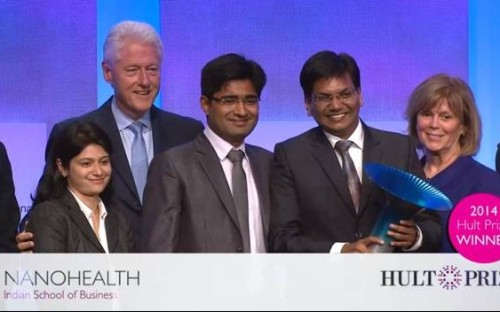ISB entered the final stages of the competition after winning the Sao Paulo regional finals, in Brazil. The students’ start-up concept, NanoHealth, aims to solve the problems of under-diagnosis and poor treatment.
NanoHealth proposed to create a network of health workers who will be equipped with a diagnostic tool – a “Dox-in-Box” – which can risk-profile patients for diabetes and hypertension.
By incorporating doctors and pharmacies into its network, the business school team hopes to become a one-stop-shop for all health services related to chronic disease.
The Dox-In-Box will also allow health workers to provide monitoring services, after a doctor within the NanoHealth network confirms the disease in a patient.
“NanoHealth is on a mission to prevent premature deaths caused due to chronic diseases in urban slums,” said Manish Ranjan, CEO.
ISB’s team saw off competition from European business schools including ESADE and HEC Paris.
The six finalist teams, who won their respective regional rounds earlier this year, have been working in the organization’s accelerator through July and August. The six-week program was hosted by Hult International Business School.
The start-ups, launched by business school and university students, were trying to tackle some of the world’s most pressing healthcare issues in one of the world’s biggest student competitions.
This year’s competition tasked entrants with developing sustainable and scalable social enterprises to address the impact of non-communicable disease (NCD) on poor urban populations.
NCD will cost low and middle-income economies $1.3 trillion over the next 20 years, according to the Hult Prize Foundation, a non-profit organization that helps accelerate the next generation of social entrepreneurs.
Backed by former US president Bill Clinton, the foundation’s competition, which received 11,000 applications this year, has involved 600 business schools since it was launched in 2009.
The other teams were from the US’s University of Pennsylvania, York University and MIT.
ISB pitched its start-up to the former US president and a judging panel which included Fadi Ghandour, the founder of logistics solutions company Aramex, in New York on Tuesday night.
Nano Health has partnered with GVK BIO, Asia's leading R&D organization. The team will use GVK BIO’s proprietary HEART – Health Emphasized Analytical and Reporting Tool – platform, a cloud-based healthcare analytics framework with multiple applications, offering analysis in order to assist medical support.
Shiva Subramaniam, Senior Vice President of GVK, said that HEART will build patient-centric healthcare and clinical systems that are simple and accessible to all, which will enable reduction of healthcare cost for all stakeholders.
Manish Ranjan, CEO of NanoHealth, said: “Our journey as a social enterprise began while attending the healthcare management program at the Indian School of Business and our alma mater has been very supportive and encouraging of us pursuing social entrepreneurship as a career option.”
The winning NanoHealth team comprised of Aditi Vaish, Ashish Bondia, Pranav Kumar Maranganty, and Manish – as well as Ramanathan Lakshmanan who participated in this competition earlier this year – all students of the class of 2014 at ISB.
The other five finalist start-ups included HEC’s Bee Healthy, ESADE’s Harambee – which raised $16,500 on crowdfunding site Indiegogo – MIT's WiCare, and York University’s REACH.
RECAPTHA :
a2
6a
a8
74




 1
1 



Comments.